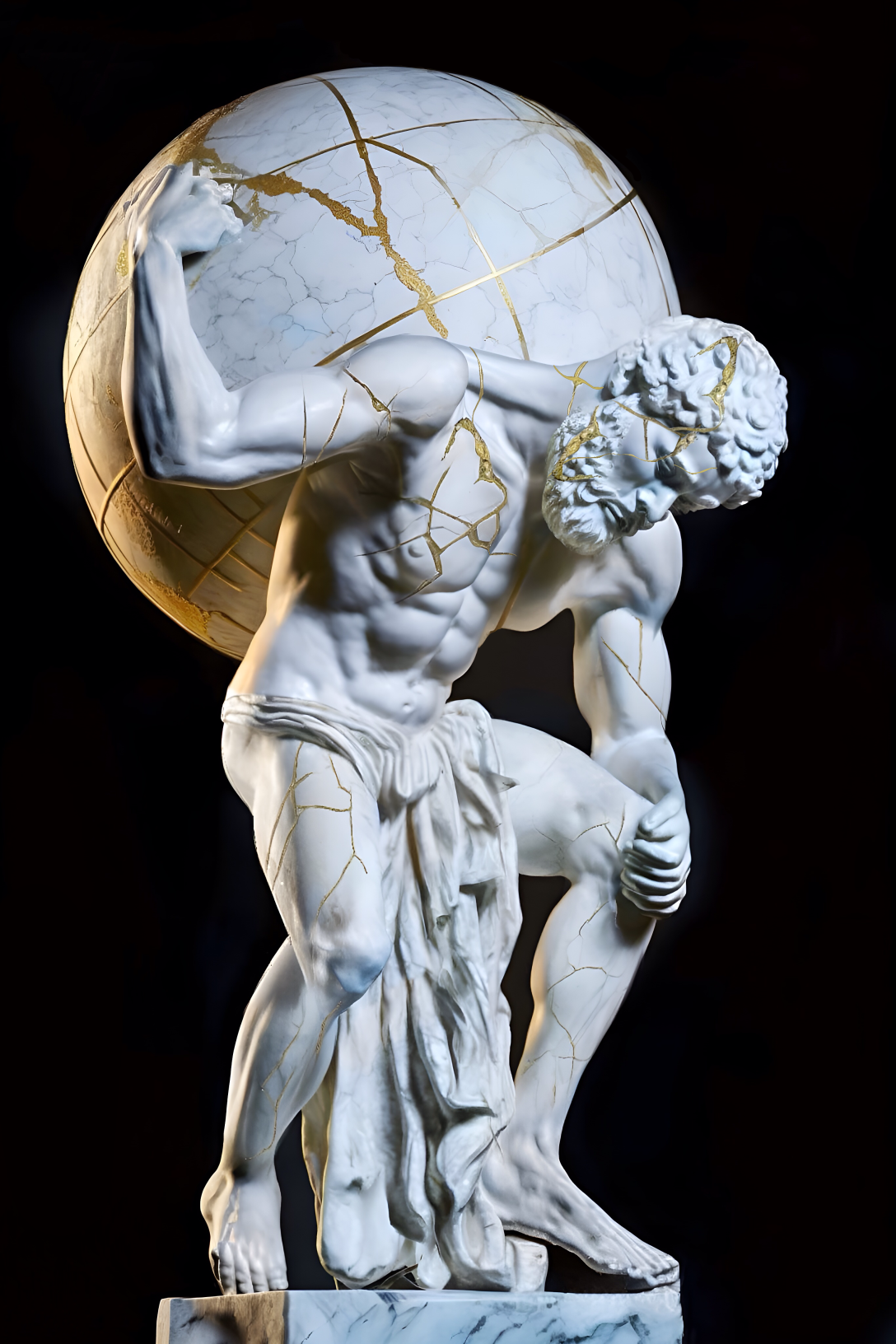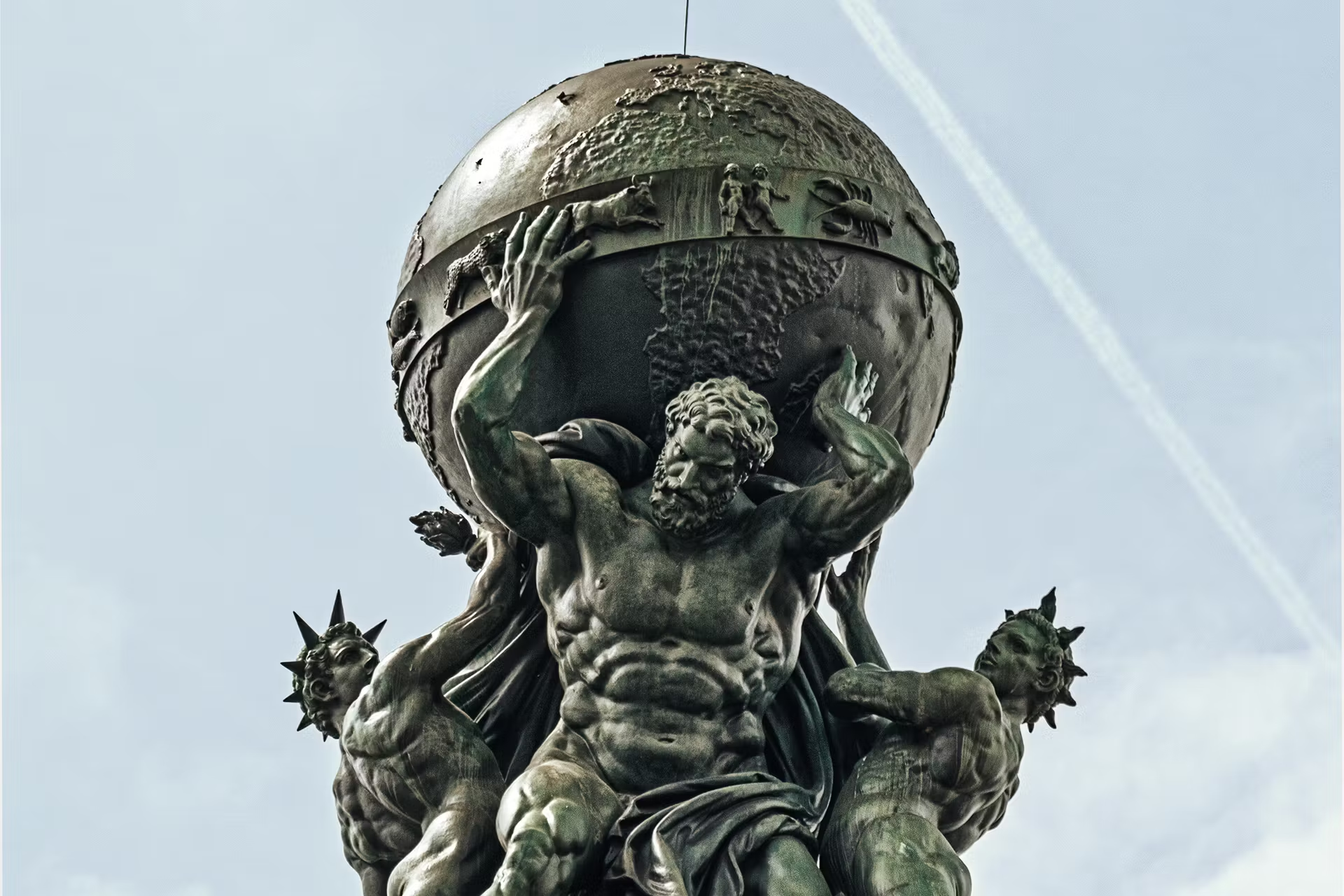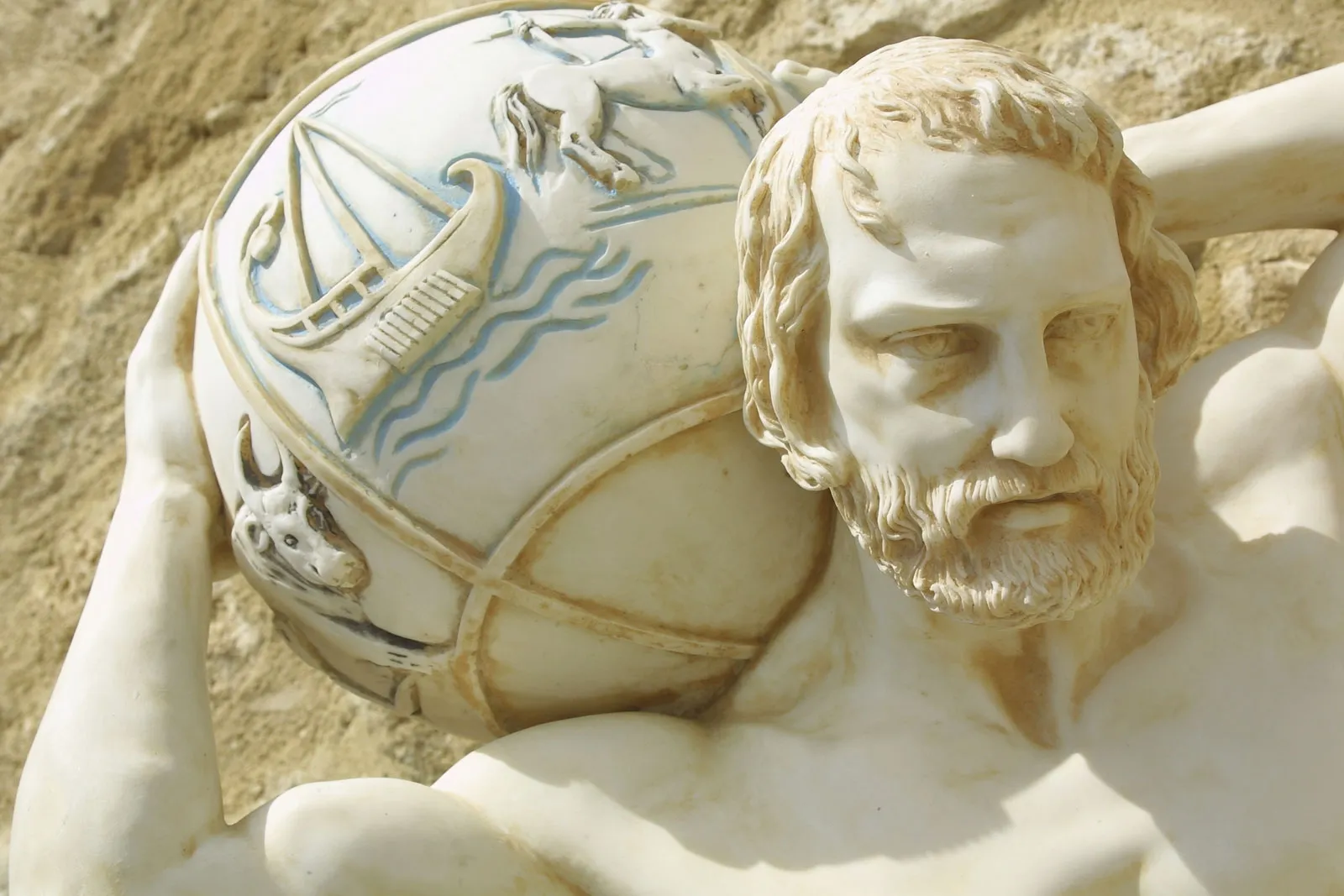Atlas is a figure from Greek mythology who is best known for his role in holding up the celestial spheres. Atlas was a god of enormous strength and power as one of the Titans. His name has become synonymous with maps and atlases because he was believed to be the god of astronomy and navigation.
According to legend, Atlas was punished by Zeus for his role in the Titanomachy, a war between the Titans and the Olympian gods. As a result of his punishment, Atlas was forced to hold up the heavens on his shoulders for all eternity. This story has become a famous symbol in art and literature, representing the idea of a burden that is too great for anyone to bear.
The story of Atlas has inspired countless works of art and literature throughout the centuries. From ancient Greek pottery to modern-day science fiction, his image has been used to represent everything from strength and power to the world’s weight on one’s shoulders. Whether you are interested in mythology or history or enjoy learning about the stories that have shaped our world, the legend of Atlas is sure to captivate and inspire.
Atlas: A Greek God Birth Story
Atlas is a Titan from Greek Mythology, famously known for his role in the Titanomachy, the great war between the Titans and the Olympian Gods. He is also known for his punishment, which involved holding up the celestial spheres on his shoulders for all eternity. This section will explore Atlas’s birth story, family, affairs, wife, and children.
Family
Atlas was the son of Iapetus and Clymene, both Titans. His siblings were Prometheus, Epimetheus, and Menoetius. Iapetus was also the father of another Titan, Cronus, who later became the ruler of the Titans.
Affairs and Wife
Atlas was married to Pleione, a nymph, and together they had several children known as the Pleiades. Atlas was also known for his affair with the goddess Eos, the goddess of dawn.
Children
Atlas and Pleione had seven daughters, who were known as the Pleiades. They were Alcyone, Asterope, Celaeno, Electra, Maia, Merope, and Taygete. Atlas was also the father of Hyas, who was born from his affair with Eos.
Atlas played a significant role in Greek Mythology, and his story continues to be told today. From his involvement in the Titanomachy to his punishment of holding up the celestial spheres, Atlas’s story has captured the imagination of many. Whether it’s in philosophy, mathematics, or astrology, Atlas’s story continues to be a source of inspiration for many.
Powers and Symbols
Atlas, the Greek god, is one of the most well-known figures in Greek mythology. He is often depicted holding the world on his shoulders, symbolising his strength and endurance. However, Atlas was more than just a strongman; he was also a hero, a symbol of power, and a figure of great importance in Greek culture.
One of Atlas’s most notable powers was his strength. He was said to be able to hold up the entire world on his shoulders, a feat that no other god or mortal could match. This strength made him a formidable figure, feared and respected by all who knew of him.

In addition to his strength, Atlas was also associated with several powerful symbols. One of the most significant was the tree, representing his connection to the earth and his ability to support and sustain life. Other symbols associated with Atlas include the pillars supporting the heavens, the nymphs serving him, and the globe he held on his shoulders.
Atlas was also closely associated with several other figures in Greek mythology. He was said to be the father of the Hesperides, the daughters of the evening star, and the Hyades, the daughters of the rain. He was also said to be the son of Maia, the mother of Hermes, and the dragon Ladon, who guarded the golden apples of the Hesperides.
Overall, Atlas was a figure of great power and importance in Greek culture. His strength, endurance, and connection to the earth made him a symbol of the best qualities of humanity, and his association with other important figures in Greek mythology only added to his significance.
Atlas’ Punishment from Zeus of Holding Earth in Detail
Atlas, the Titan god of endurance and astronomy, was punished by Zeus, the king of the gods, for leading a revolt against him. As a consequence of his actions, Atlas was forced to hold the weight of the heavens upon his shoulders for eternity.
However, some versions of the myth suggest that Atlas’ punishment was not holding the heavens but rather the Earth. According to one such version, Atlas was tasked with holding the Earth on his shoulders as a punishment for his role in the Titanomachy, a ten-year battle fought between the Titans and the Olympian gods.
The story of Atlas’ punishment is famous and has been retold in various forms throughout history. In Ayn Rand’s novel, “Atlas Shrugged,” John Galt is depicted as carrying the world’s weight, referencing Atlas’ punishment.
The myth of Atlas’ punishment has also been used as a metaphor for the burden of responsibility. In this context, holding up the world represents the weight of responsibility that some individuals carry, whether it be for their families, their communities, or the world at large.
In conclusion, Atlas’ punishment of holding the weight of the heavens or the Earth on his shoulders is a well-known myth that has been retold in various forms throughout history. It serves as a reminder of the consequences of challenging the authority of the gods and the burden of responsibility that some individuals carry.
Myths
Atlas is a prominent figure in Greek mythology, and his story is intertwined with those of other gods and heroes. One of the most well-known myths involving Atlas is his punishment by Zeus for leading the Titans in their war against the Olympians. As a result of his actions, Atlas was forced to hold up the sky on his shoulders for all eternity.
Another popular myth involving Atlas is his role in the story of Heracles and the Golden Apples. Heracles was tasked with retrieving the apples from the garden of the Hesperides, which a dragon guarded. Atlas agreed to help Heracles by holding up the sky while he went to retrieve the apples. However, when Heracles returned, Atlas refused to take the sky back, forcing Heracles to trick him into taking it again.
Atlas is also associated with the Pillars of Hercules, which were said to mark the edge of the known world. According to legend, Atlas was responsible for holding up these pillars as well, which allowed ships to pass safely through the narrow strait between Europe and Africa.

In addition to his role in these myths, Atlas is also sometimes associated with other figures from Greek mythology, such as Prometheus, whom Zeus similarly punished for his actions, and Poseidon, who was said to have created the islands of the Mediterranean Sea.
Other gods and heroes, such as Pan and the Twelve Labors of Heracles, also play a role in the myths surrounding Atlas and his family. Overall, the stories surrounding Atlas and his connections to other figures in Greek mythology continue to captivate and inspire people worldwide.
Exciting Facts
Atlas, the Greek god of endurance and astronomy, is one of the most fascinating figures in Greek mythology. With his immense strength and unwavering determination, he holds up the celestial sphere on his shoulders, a task Zeus assigned him as punishment for his role in the Titanomachy.
One of the most famous depictions of Atlas is the Farnese Atlas, a 2nd-century Roman marble statue that shows him holding up the heavens. This statue is considered one of ancient Greek sculpture’s most important surviving examples.
In literature, Atlas is often portrayed as a stout-hearted figure who embodies the ideals of strength and perseverance. Plato, for instance, describes him as a symbol of the human spirit’s ability to endure the world’s weight. In the story of Prometheus, Atlas’ brother Epimetheus is tricked by Prometheus into accepting the gift of fire from the gods, which angers Zeus and leads to the creation of Pandora.
In astronomy, Atlas is associated with the celestial sphere, which he holds on his shoulders. This sphere was believed to contain the stars and planets and was considered the boundary between the earthly and divine realms.
Atlas is also associated with several geographical locations, including Asia, Morocco, and the Atlantic Ocean. In Greek mythology, he was said to have guarded the Hesperides, a group of nymphs who tended a garden of golden apples in the far west of the world.
In the underworld, Atlas was said to have been punished for his role in the Titanomachy by being forced to hold up the heavens for all eternity. According to some versions of the myth, he was eventually freed by Heracles, who tricked Atlas into taking back the celestial sphere while he went to fetch the golden apples of the Hesperides.
Atlas is often depicted with a beard and is associated with trees, including the cypress and the pine. He is also associated with several other figures in Greek mythology, including Eos, Leto, and Helios.
In astrology, Atlas is associated with the celestial spheres, believed to be the home of the gods and the source of all life. He is also associated with the zodiac sign of Virgo, which is said to be ruled by Mercury.
Overall, Atlas is a fascinating figure who has captured the imagination of people for centuries. With his strength, endurance, and determination, he embodies many qualities we admire in ourselves and others.
Frequently Asked Questions
What is Atlas known for?
Atlas is known as a Titan in Greek mythology who was tasked with holding up the celestial spheres on his shoulders. He is often depicted carrying a globe or sphere on his back, representing the weight of the heavens.
Why was Atlas punished?
According to myth, Atlas was punished by Zeus for leading the Titans in a war against the Olympian gods. His punishment was to hold up the sky on his shoulders for all eternity.
Who is Atlas?
Atlas is a figure from Greek mythology, specifically a Titan, known for his strength and endurance in holding up the celestial spheres. He is often depicted as a muscular man with a globe or sphere on his back.
What are the powers of Atlas?
Atlas was known for his immense strength and endurance, as he could hold up the weight of the heavens on his shoulders. He was also a skilled navigator and was said to have easily navigated the seas and stars.
Who was Atlas?
Atlas was a Titan from Greek mythology tasked with holding up the celestial spheres on his shoulders. He was the son of Iapetus and Clymene and the brother of Prometheus, Epimetheus, and Menoetius.
Where did Atlas live?
In Greek mythology, Atlas was said to have lived in the Atlas Mountains in North Africa. These mountains were named after him, as they were believed to be the pillars that held up the sky.

